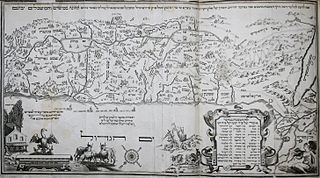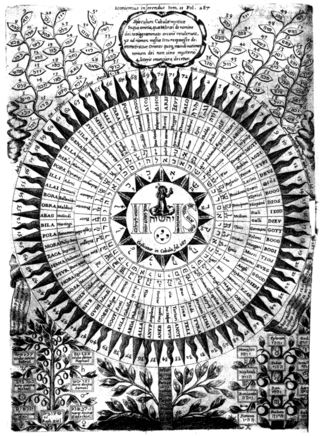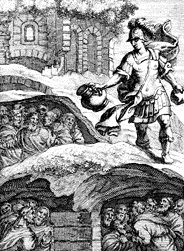The Book of Judges is the seventh book of the Hebrew Bible and the Christian Old Testament. In the narrative of the Hebrew Bible, it covers the time between the conquest described in the Book of Joshua and the establishment of a kingdom in the Books of Samuel, during which biblical judges served as temporary leaders.
The Book of Joel is a Jewish prophetic text containing a series of "divine announcements". The first line attributes authorship to "Joel the son of Pethuel". It forms part of the Book of the twelve minor prophets or the Nevi'im ("Prophets") in the Hebrew Bible, and is a book in its own right in the Christian Old Testament. Joel is not mentioned elsewhere in either collection.
The Book of Obadiah is a book of the Bible whose authorship is attributed to Obadiah, a prophet who lived in the Assyrian Period. Obadiah is one of the Twelve Minor Prophets in the final section of Nevi'im, the second main division of the Hebrew Bible. The text consists of a single chapter, divided into 21 verses with 440 Hebrew words, making it the shortest book in the Hebrew Bible, though there are three shorter New Testament epistles in Greek. The Book of Obadiah is a prophecy concerning the divine judgment of Edom and the restoration of Israel.
The Book of Zephaniah is the ninth of the Twelve Minor Prophets of the Old Testament and Tanakh, preceded by the Book of Habakkuk and followed by the Book of Haggai. Zephaniah means "Yahweh has hidden/protected," or "Yahweh hides". Zephaniah is also a male given name.

Yahweh was an ancient Levantine deity, and national god of the Israelite kingdoms of Israel and Judah. Though no consensus exists regarding the deity's origins, scholars generally contend that Yahweh emerged as a "divine warrior" associated first with Seir, Edom, Paran and Teman, and later with Canaan. The origins of his worship reach at least to the early Iron Age, and likely to the Late Bronze Age, if not somewhat earlier.

The Israelites were a group of Semitic-speaking tribes in the ancient Near East who, during the Iron Age, inhabited a part of Canaan.
Abdiel is a biblical name which has been used as the name for a number of several notable people. The name has the same meaning as Obadiah and is cognate with the Arabic name Abdullah. Abdiel is mentioned a single time in the Bible, in 1 Chronicles 5:15: "Ahi the son of Abdiel, the son of Guni, chief of the house of their fathers."

There are various names of God, many of which enumerate the various qualities of a Supreme Being. The English word god is used by multiple religions as a noun to refer to different deities, or specifically to the Supreme Being, as denoted in English by the capitalized and uncapitalized terms God and god. Ancient cognate equivalents for the biblical Hebrew Elohim, one of the most common names of God in the Bible, include proto-Semitic El, biblical Aramaic Elah, and Arabic ilah. The personal or proper name for God in many of these languages may either be distinguished from such attributes, or homonymic. For example, in Judaism the tetragrammaton is sometimes related to the ancient Hebrew ehyeh. It is connected to the passage in Exodus 3:14 in which God gives his name as אֶהְיֶה אֲשֶׁר אֶהְיֶה, where the verb, translated most basically as "I am that I am" or "I shall be what I shall be", "I shall be what I am" In the Hebrew Bible, YHWH, the personal name of God, is revealed directly to Moses. Correlation between various theories and interpretation of the name of "the one God", used to signify a monotheistic or ultimate Supreme Being from which all other divine attributes derive, has been a subject of ecumenical discourse between Eastern and Western scholars for over two centuries. In Christian theology the word is considered a personal and a proper name of God. On the other hand, the names of God in a different tradition are sometimes referred to by symbols. The question whether divine names used by different religions are equivalent has been raised and analyzed.

Jezebel was the daughter of Ithobaal I of Tyre and the wife of Ahab, King of Israel, according to the Book of Kings of the Hebrew Bible.

The Assemblies of Yahweh is a nonprofit religious organization with its international headquarters in Bethel, Pennsylvania, United States. The organization developed independently out of a radio ministry begun by Jacob O. Meyer in 1966. The Assemblies of Yahweh is the largest sacred name group, but it is not part of the Sacred Name Movement.
Richard Elliott Friedman is an American biblical scholar, theologian, and translator who currently serves as the Ann and Jay Davis Professor of Jewish Studies at the University of Georgia.

Jehovah is a Latinization of the Hebrew יְהֹוָהYəhōwā, one vocalization of the Tetragrammaton יהוה (YHWH), the proper name of the God of Israel in the Hebrew Bible/Old Testament. The Tetragrammaton יהוה is considered one of the seven names of God in Judaism and a form of God's name in Christianity.
Yahweh is a reconstruction of the name of the God mentioned in the Hebrew Bible.

The term Catholic Bible can be understood in two ways. More generally, it can refer to a Christian Bible that includes the whole 73-book canon recognized by the Catholic Church, including some of the deuterocanonical books of the Old Testament which are in the Greek Septuagint collection, but which are not present in the Hebrew Masoretic Text collection. More specifically, the term can refer to a version or translation of the Bible which is published with the Catholic Church's approval, in accordance with Catholic canon law.

The Sacred Scriptures Bethel Edition (SSBE) is a Sacred Name Bible which uses the names Yahweh and Yahshua in both the Old and New Testaments. It was produced by Jacob O. Meyer, based on the American Standard Version of 1901 and it contains over 977 pages. The Assemblies of Yahweh printed 5,500 copies of the first edition in 1981. It is also used by some members of the Sacred Name Movement.
Elder Jacob O. Meyer was the founder, president and directing elder of the Assemblies of Yahweh. Among his roles he was also a farmer, broadcaster, translator, preacher, counselor and writer and considered by the Assemblies of Yahweh to be a scholar, rabbi and spiritual leader. He taught classes at Dalet School and Obadiah School of the Bible, as well as pioneering and editing two monthly magazines, The Narrow Way and The Sacred Name Broadcaster.

Obadiah is a character in 1 Kings in the Hebrew Bible. He was a majordomo in charge of Ahab's palace.
Obadiah is a masculine given name. It is of Biblical Hebrew origin, and its popularity derives from Obadiah, a prophet in the Hebrew Bible and in the religious traditions of Christianity, Judaism, and Islam.








